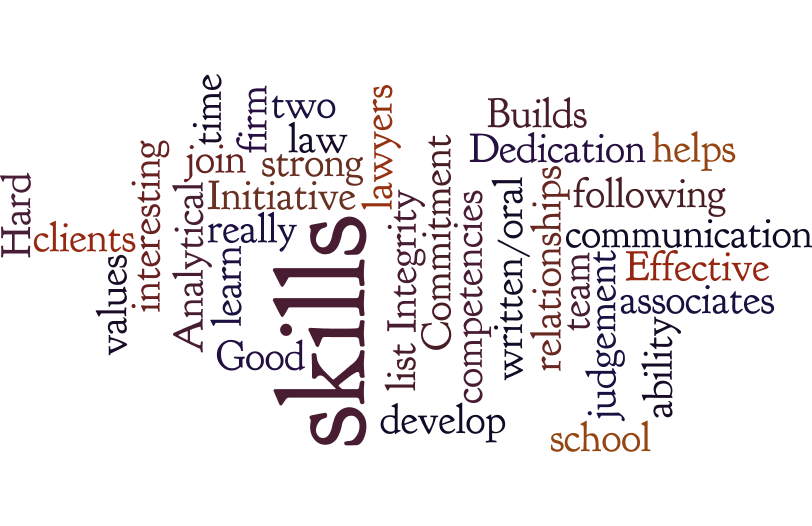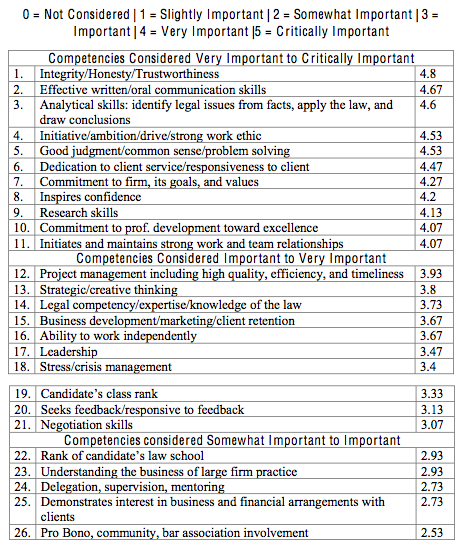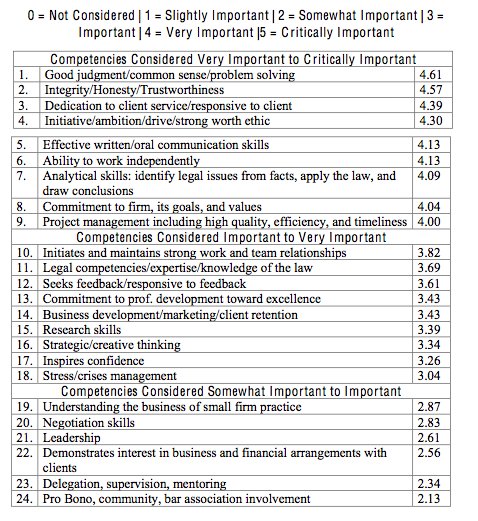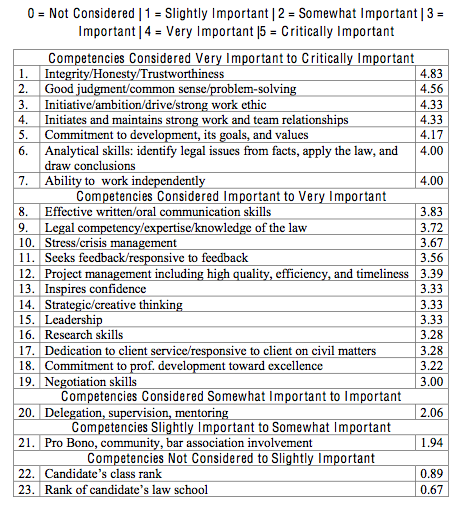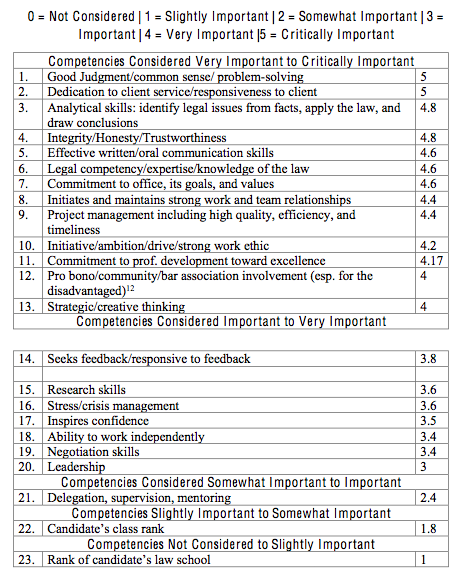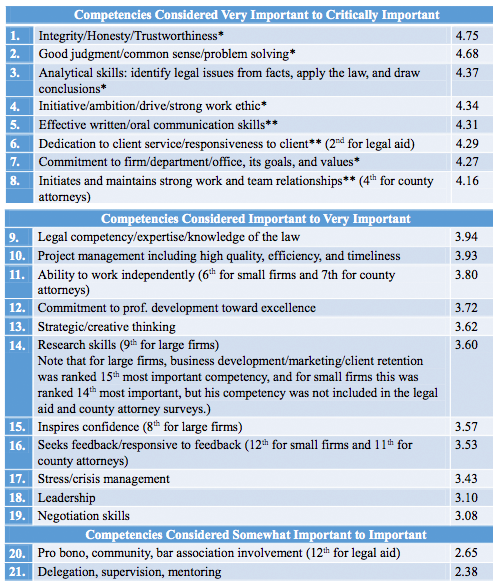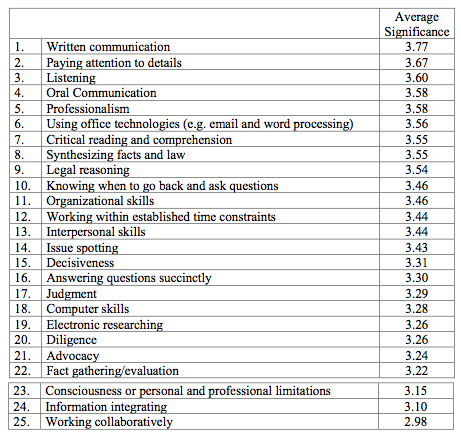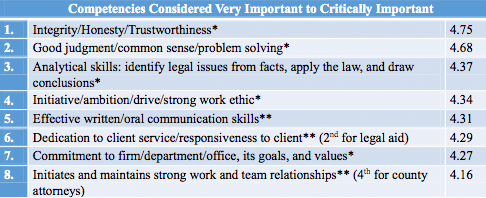A few years ago a paper was released on SSRN by Professor Neil W. Hamilton entitled Changing Markets Create Opportunities: Emphasizing the Competencies Legal Employers Use in Hiring New Lawyers (Including Professional Formation/Professionalism). I thought it sounded interesting and gave it a read. From the abstract:
To guide legal educators and law students in responding to challenging markets both for entry-level employment and for applications to law schools, this article analyzes empirical research on the competencies that legal employers, the profession itself, and clients are looking for in a new lawyer. The article advances the proposition that law schools can build on an existing strength of helping each student develop knowledge of doctrinal law, legal analysis, legal research, legal writing and oral advocacy to do better at helping each student develop additional important competencies (and have evidence of those competencies) that legal employers, the profession, and clients and value, particularly the professional formation (professionalism) competencies.
The article also helps each student understand the importance of developing transferable skills (or competencies) that equip the student to respond over a career to changing markets for legal services. An overall theme for both legal educators and law students is to view these changing markets as opportunities to grow in new directions and thus to differentiate from competitors.
Translation: I surveyed a bunch of lawyers and asked them what they were looking for when hiring new associates. I also looked at surveys other people did on the same topic. This paper goes over what I found.
I’m going to list out all of the survey data first, then offer commentary afterwards.
Survey of 14 Largest Firms In Minnesota
Survey of 23 Smalls Firms (2-9 lawyers) in Minnesota
Survey of 18 County Attorneys in Minnesota
Survey of Legal Aid Offices In Minnesota
Average Ratings Across All Four Above Surveys
National Conference of Bar Examiners Survey of New Lawyers with 1-3 Years Experience
The survey asked what skills, abilities, and knowledge domains are significant to the newly licensed lawyer. On a scale from “1” as “minimally significant” to “4” as “extremely significant.”
So this is what new lawyers think they need, which is different from what employers want.
Federation of Law Societies of Canada Survey of New Lawyers
[Asked new lawyers to]…rate both the frequency with which each lawyer performed or used a competency and the lawyer’s perception of the severity of the consequences if the lawyer did not possess each competency.
2013 Harvard Law School Survey of 124 Attorneys at Large Law Firms
Respondents also rated the importance for associates of a list of seven knowledge bases and skills (with “1” being “not at all useful” and “5” being “extremely useful”). Sounds like Harvard Law employers wish that Harvard Law grads went to B-school as well. If you didn’t (or just want to learn more about business) might I suggest Consultant’s Mind?
Essential Skills For New Lawyers
Just to save you the trouble from having to scroll back up, here is the average of Hamilton’s surveys again:
What’s interesting to me about this list is that only two competencies are really “Hard” law school skills:
- Analytical ability
- Effective written/oral communication skills
You can learn the following skills over time if you join a firm that helps its associates develop as lawyers:
- Dedication to clients
- Commitment to values
- Builds strong team relationships
But #1, #2, and #4 are just flat out you-have-it-or-you-don’t:
-
Integrity
-
Good judgment
-
Initiative
These are the three “must have” skills that employers are searching for.
- So is it really a wonder that so many practicing lawyers repeatedly talk about ethics?
- Big firm partners advocate for the same things.
- Judges and lawyers with over twenty years of experience all said the same thing when asked what is necessary to succeed as a new lawyer – integrity and relationships.
The Legal Job Market Sucks
There’s no getting around this point. Yes, hiring is up at some firms for certain areas, but it’s still down as a whole. And even though the incoming class of law students this year looks to be one of the smallest in decades, there are still too many law students graduating and not enough entry level jobs. The competition for these jobs will continue to be brutal.
The New York Times just chimed in as well, talking about the burden of debt facing law students, the cutthroat legal job market, and alternative careers. If you’re a new lawyer, you have to do something to differentiate yourself. You have to stand out from the crowd. If you’re in the top 10% of your class at almost any law school, you’re probably in a good place. But I’ve spoken with hundreds of 3Ls in the past few months and the majority of them did not have jobs lined up after graduation. Many of them were thinking of getting an LLM or an MBA. Not out of any real desire it seemed, but that they were hoping that some extra credentials (and hoping that a couple more years might give the market time to recover) would get them a job.
But extra credentials are not a pathway to success in this environment. More than likely they’re just adding more debt and delaying the inevitable. Which is that if you’ve gone to law school in the past few years, you signed up for a rough ride. Getting a LLM in this environment might show “initiative,” but it’s maybe not a display of “good judgment,” except for a few specific LLMs. New lawyers would be far better off spending time and energy on finding mentors and building real relationships. Because in those two contexts, you have the ability to display integrity, good judgment, and initiative. Which is likely a better in-road to finding a job then spamming out resumes or hiding in the ivory tower for another couple of years.
Why Should Someone Believe In You?
That’s the real question. If you haven’t already built a relationship with the firm or someone in it (protip: this is what you should have been doing in law school instead of attending the law school prom or whatever), then it’s up to you to make someone believe in you. That you are competent, industrious, and ethical. That you possess drive, ambition, and grit.
What it really always comes back around to trust. Just as clients want to know they can trust a lawyer when they retain them, firms want to know that they can trust the new lawyers they hire. That they are not wasting their time or investment. This is true at firms big and small.
Firms want to know that you are worthy of an investment of their time and money. There is no law school class for that. There is no experiential initiative that can cover that ground. Either you are a principled person, worthy of another’s trust, or you are not.
Something to think on next time you are walking into an interview.
Also, you should join LawyerSmack to get help for that interview. Or just to complain about your boss.
Hamilton, Neil W., Changing Markets Create Opportunities: Emphasizing the Competencies Legal Employers Use in Hiring New Lawyers (Including Professional Formation/Professionalism) (2014). South Carolina Law Review, Vol. 65, 2014, Forthcoming; U of St. Thomas (Minnesota) Legal Studies Research Paper No. 14-13. Available at SSRN: http://ssrn.com/abstract=2412324

